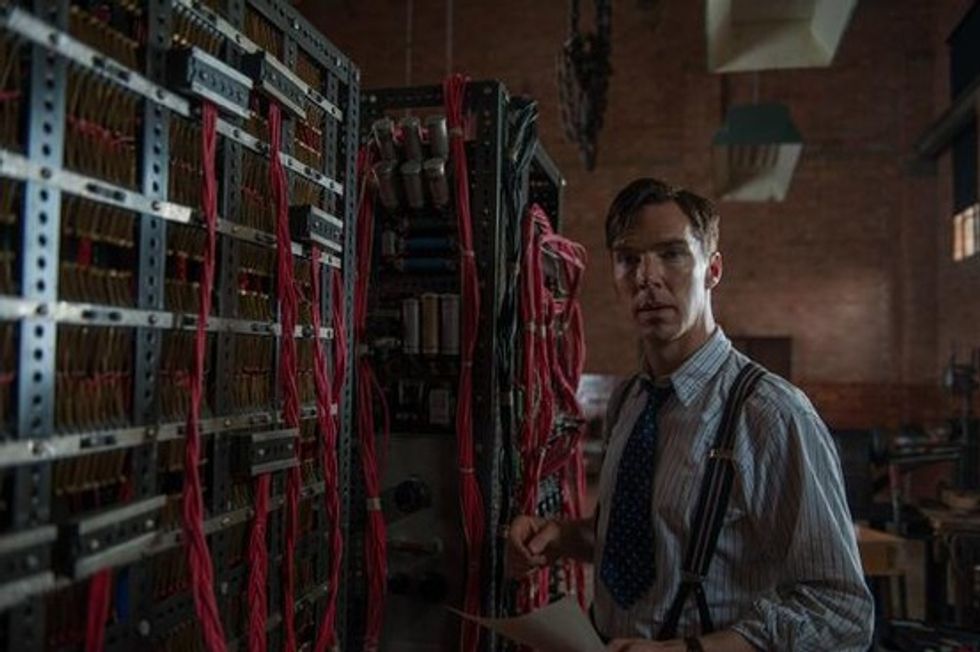
U.S. House Speaker John Boehner, a Republican from Ohio, is sworn in during the first session of the 114th Congress in the House Chamber at the U.S. Capitol in Washington, D.C., U.S., on Tuesday, Jan. 6, 2015. (Bloomberg/Bloomberg via Getty Images)

The tides turned against the Allied forces. At least, that’s how it looked when Adolf Hitler ordered his infamous Panzers to meet the invasion as they stormed the beaches at Normandy on D-Day.
Garcia had to work fast.
The wildly successful double agent swiftly convinced Hitler that the principle invasion was still to take place in Calais, 200 miles away from Normandy.
Normandy, he insisted, was diversionary only.
The 1st SS Panzer Division stopped in their tracks. Literally. They were ordered to Calais, where they sat for a month—waiting for an invasion force (the so called “First United States Army Group”) that never existed in the first place; a force that Garcia had been successful in convincing the Nazis was a real million man army.
Just 11 months later, Hitler killed himself and shortly thereafter in May of 1945, the Allies declared victory in Europe.
Much like the atomic bomb was the final, be-all-end-all blow to the Pacific theater, D-Day was absolutely critical to the Allies’ success on the European front. Without it, it’s not certain how the war would have gone from there.

And one man—Juan Pujol Garcia of Spain—was almost exclusively responsible for the intelligence efforts that convinced Hitler himself to turn the Panzers around—allowing the Allied forces to advance.
Just one un-extraordinary man.
As Lucas Reilly of MentalFloss.com writes, Garcia’s life had amounted to nothing more than working on a “sinking chicken farm and marrying a girl he wasn't sure he loved. His life was normal, if not boring.”
Reilly further writes:
“But life in 1930s Spain was anything but boring. In 1931, King Alfonso XIII sensed his popularity crumbling and fled the country without formally abdicating, leaving Spain a political vacuum. Communist and Fascist groups violently fought for power. Bullrings became theaters for public massacres, and the corpses of politicians littered Madrid’s alleys.”
You can read Reilly’s rendition of the full account here, but suffice it to say the following:
Garcia was just one unimportant man who, outraged at the blanket of oppression beginning to sweep Europe in the form of Nazism, Communism and Fascism, decided to take matters into his own hands.
Rejected twice by the very Allies he wanted to help, it wasn’t until he built a rapport as a Nazi “spy” that he was finally noticed. He went from washed-out chicken farmer and military deserter, to one of the most important double agents of the entire war. He also the “first and only person decorated by both sides,” receiving both the Iron Cross from the Germans (who never doubted his “efforts”), and induction into the Most Excellent Order of the British Empire, by the King of England.
He saw a problem, and didn’t care about the odds. He just simply went to work.
At the same time and on the same continent was another future Most Excellent Order of the British Empire inductee: brilliant young mathematician Alan Turing.

Like Garcia, Englishman Alan Turing was largely apolitical, that is, until the reality of Nazi evil became too large to ignore. Following Prime Minister Neville Chamberlain’s declaration of war and subsequent request that all who could, report for duty in the nation’s military or civil defense, Turing promptly directed himself to the Government Code and Cipher School at Bletchley Park.
The “school” was really where the British planned to break the Enigma Machine code, the system that allowed for the Germans to communicate almost entirely undetected.
The goal was simple . . . sort of. Solve the various Enigma Machines’ patterns, the U-boat version of which—by Turing’s rapid calculations— possessed almost a sextillion possible combinations. In other words, it was a nearly impossible task.
As Glenn Beck writes in his book, “Dreamers and Deceivers,” Turing had just one question:
“When can I start?”
Despite protests from his colleagues that he was wasting his time on the impossibly complex U-boat Enigma Machine as opposed to focusing on the purportedly simpler versions used by the German army and the air force, Turing plowed forward—eventually breaking the Enigma code and freeing the Atlantic from the incessant, undetected attacks by U-boats.
It also paved the way for an incredibly important day in June 1944. Beck writes, “Almost every element of the arsenal, including one hundred thousand American and Canadian soldiers, sailors and airmen, had crossed a once perilous ocean that Alan Turing, more than any other man, had made safe from Adolf Hitler’s Nazi U-boats.”
Turing, in another way, made D-Day possible.
He was yet another individual who didn’t care about the odds or the voices of negativity trying to shout him down. He only cared about getting the job done.
We’ll get back to Garcia and Turing in just a moment.
This week saw one of the biggest challenges to a sitting Speaker of the House since the Civil War. It’s certainly not without cause—as Speaker John Boehner (R-Ohio) has time and again rejected the principles he purports to hold, each time promising he (and other party leaders) will hold strong “the next time,” because we just have to get through the next election.

I’m not alone as I sit back in disappointment—once again—watching self-professed liberty loving conservatives allow their actions speak louder than their words. Whether they’ve been untrue about their core beliefs from the outset, or they’ve been talked into thinking the Washington Way is the ONLY way, or they’re trying to protect their committee positions (not exactly an extraordinary fear, given Boehner’s reaction to those who voted against him), one thing is the same: we sent— in historic fashion—a wave of politicians to Washington to change the status quo.
And what does their leader do with this newly acquired power? He gives away nearly a YEAR of it to the party that lost. Or, as Betsey McCaughey of The American Spectator puts it, Boehner’s decision on the continuing resolution / omnibus bill (or “CRomnibus”) allowing “spendaholic Democrats who have in effect been fired by voters make budget decisions through next September.”
And yet he was reelected to his position of power.
This comes on the heels of years of Barack Obama, who has brought us a nearly doubled national debt, an unworkable healthcare “reform” that is set to ruin—rather than fix—our system, and a weakened national security in the face of unabashed evil embodied by the likes of Islamic State … among other things.
If we can’t trust the party we sent to deal with the president and his party’s terrible decisions, then what could ever possibly change our country’s trajectory?
Not surprisingly, I’ve got hopelessness on the brain. “What is the point?” keeps ringing in my ears.
Then again so does the idea of Garcia. And Turing. And anyone else who ever took on an impossible task and eventually altered the world indefinitely.
ONE PERSON really does have the power to change the course of history. It really can be done.
All is not necessarily lost.
We just need to keep looking (and praying) for that “one.” Or two—or however many it takes.
It can be done, because it has.
Mary Ramirez is a full-time writer, creator of www.afuturefree.com (a political commentary blog), and contributor to The Chris Salcedo Show (TheBlaze Radio Network, Saturday, from noon to 3pm ET). She can be reached at: afuturefree@aol.com; or on Twitter: @AFutureFree.
–
TheBlaze contributor channel supports an open discourse on a range of views. The opinions expressed in this channel are solely those of each individual author.